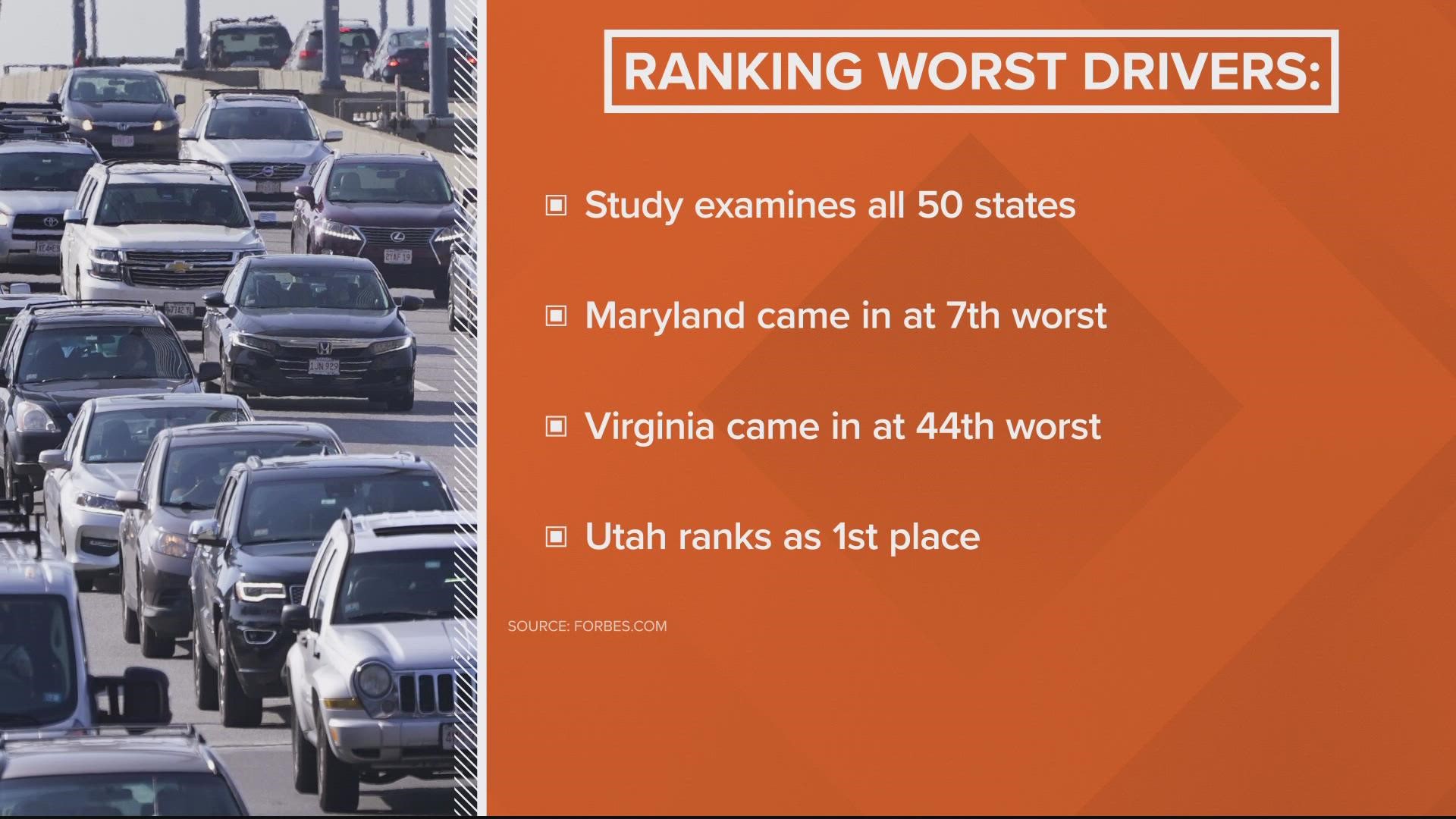MARYLAND, USA — Driving in the DMV can be a nightmare, regardless of whether you're behind the wheel in D.C., Maryland or Virginia. But drivers in Maryland are more likely to get angry about it. That's according to a recent survey from Forbes Advisor.
Forbes surveyed 5,000 drivers across the nation to find the states with the most confrontational drivers. Utah topped the list, with Missouri and Colorado tailgating close behind.
The survey also found that more than 1 in 5 drivers have seen someone cause an accident due to road rage, and 23% of those surveyed know of someone in their state that has become injured in a road rage incident.
Each state was scored out of 100 points. Here's how the score was calculated, according to Forbes:
- Bumped, rammed into or otherwise damaged my car on purpose: 15% of score
- Followed me then got out of their vehicle to yell at or fight with me: 15% of score
- Forced my car off the road: 15% of score
- Pointed a gun at me or shot at me: 15% of score
- Cut me off on purpose: 10% of score
- Exceeded the speed limit to block my car from changing lanes: 10% of score
- Honked at me in frustration: 5% of score
- Made rude or offensive gestures at me: 5% of score
- Tailgated my car: 5% of score
- Yelled at me, insulted me, cursed at me or made threats: 5% of score
D.C. drivers were not included in the online survey conducted between Aug. 17-26, 2022. Maryland drivers ranked No. 7 overall with a score of 89.29. On the opposite end of the list, Virginia drivers ranked No. 44 with a score of 71.24.
RELATED: Off-duty FBI officer exchanged gunfire with driver following crash on I-295, police report says
Here are some tips to avoid road rage from defensivedriving.org.
- Practice polite driving habits: Avoid tailgating, cutting off other vehicles, speeding, weaving, leaving high beam headlights on, and erratic braking. Don’t drive in the left lane slower than the rest of traffic. Merge politely, and always err on the side of being courteous. This is smart to do not just to avoid road rage, but to make driving easier and more pleasant for every motorist.
- Slow down: Simply let aggressive drivers go around you and typically, they will quickly be on their way.
- Get away from aggressive drivers: If you notice a driver with aggressive behavior, get some distance between you, whether you slow down and let them get ahead or change lanes so you’re not right next to each other.
- Don’t make rude gestures or yell at other drivers: Remember, you’re not the police, and it’s not your job to remind others how to drive, even if they’re doing a terrible job. Avoid making eye contact with an aggressive driver who is trying to pick a fight.
- Use your horn sparingly: Horns should primarily be used in emergency situations. Tap your horn lightly if you need to get a driver’s attention, and give drivers ahead of you at lights a few extra seconds of grace before honking to remind them to move through the intersection.
- Call a road rage hotline: Many states now have aggressive driver hotlines that you can call to report aggressive drivers. Instead of confronting an aggressive driver, simply let the authorities know about their actions and how they can be found.
- Avoid making driving a competitive sport: You’re not a race car driver — you don’t have to win on the road. In fact, winning as a regular driver is simply getting home safe. Getting worked up over a vehicle that’s cut you off or gotten in your way somehow isn’t worth it. Remember: getting home safely is more important than teaching another driver a lesson.
- Apologize if you’ve done something wrong: If you’ve accidentally cut off another driver, braked too fast, or made some other mistake that could be offensive, simply smile and wave as an apology. This will disarm and calm most drivers.
- Don’t drive under distress: Avoid driving if you’re angry, upset, or drowsy.
- Adjust your driving attitude: Give other drivers the benefit of the doubt. Many mistakes are unintentional and not meant as a personal offense. Consider whether responding aggressively is worth being injured or killed.
- Have reasonable expectations about your travel time: Know when you’ll be driving in traffic, give yourself plenty of time, and don’t set unreasonable expectations for how fast you’ll get to your destination.
- Call 911 if you’re under attack: If an aggressive driver attacks you, call 911 right away and stay on the phone with the dispatcher. Consider driving to the nearest police station, convenience store, or other public location with witnesses. Do not drive home.

